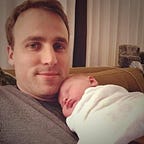This Time Machine Saves Lives
Now if it is in our power to do noble or base acts, and likewise in our power not to do them, and this was what being good or bad meant, then it is in our power to be virtuous or vicious. Aristotle, Nichomachean Ethics, 1113b11
Imagine you had a time machine that could save lives.
Imagine you could go back to 2005 to reinforce the levies and floodwalls in New Orleans. Imagine being able to evacuate people from the beaches of Thailand in 2004 before the tsunami hit. Imagine you could prevent the 9/11 terrorists from boarding those planes.
Now consider this: We are in exactly such a position today. We are facing a once-in-a-century calamity with COVID-19 that could claim more lives than all of the aforementioned natural disasters combined. But unlike most disasters, we can actually prevent this one from happening. Our actions over the next few weeks can prevent death, disease, and economic disaster. In fact, given the potential impact of our actions, I’d argue that we will soon be making the most important moral decisions of our lives.
The actions we need to take are pretty clear: stay as isolated as possible to prevent transmission of the virus. If you can work from home, do that. If you have to go to work, you can still practice some forms of social distancing. I asked Andy Slavitt, the former Acting Administrator of the Centers for Medicare and Medicaid Services (CMS), what he recommended and he put it this way:
Now let’s use our time machine to look into the future. If you’re standing in the U.S., it sees about a week into the future. This future can be seen simply by reading the headlines from Italy. Two days ago, an Italian writer named Mattia Ferraresi sent us a message from this future, writing bluntly:
Don’t do what we did. Many of us were too selfish to follow suggestions to change our behavior. Now we’re in lockdown and people are needlessly dying.
Despite this desperate message from the future, I’ve heard some troubling things from friends and neighbors over the past few days. I’ve heard people insisting they will still take their vacations. I’ve had people tell me that “people like us” aren’t at risk. I’ve seen people sitting shoulder-to-shoulder in meetings at the office.
And if I’m honest, I’ve felt myself resisting social distancing. At first, I didn’t want to keep the kids home. When we decided to all stay home and avoid most contact, I still felt reluctant to do small things. For example, I didn’t want to pull the stroller back when someone approached to say hello to the baby. The first time I refused to shake a friend’s hand, I felt like a germaphobic asshole.
Social distancing is weird, but it saves lives. We need to help each other get over it.
Yes — social distancing is weird. But being a little weird is a small price to pay for saving lives, so we need to help each other get over it. As I heard Anthony Fauci of the NIH say on Reliable Sources on CNN this morning, “For a while, life is not going to be the way it used to be in the United States.”
Social distancing will also undoubtedly put a strain on certain businesses. But the pain we’ll endure will certainly be worse (for both business and human life) if we ignore the warnings calling to us from Italy.
So please: Let’s use our time machine to do some good in the world. There are plenty of people that need to be interacting with others: doctors, nurses, and people working at the grocery store. These people are putting themselves at risk to keep civil society humming. Don’t be the asshole that gives their parents COVID-19 just because you felt “people like us” aren’t at risk. Be the germaphobic asshole that won’t shake their hand. They may look at you weird, but eventually — whether you know it or not — they’ll thank you.
